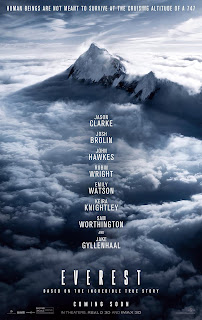Why? Why would anyone choose to scale Everest? It’s a question
I pondered at the start of Everest,
and one the film fails to answer.
It all begins as something of a travelogue. Back in 1996
(this is based on a true story), plucky New Zealander Rob Hall (Jason Clarke),
a seemingly sensible extreme sports fanatic, has set up a business in leading hiking
expeditions up Mount Everest under the name Adventure Consultants. He’s not
alone though. Rival companies (including one led by Scott Fischer (a heavily
bearded Jake Gyllenhaal)) are also taking up groups of clients, clients that
are little more than men and women taking a gap year style trip in the midst of
mid-life crisis – and have paid $64,000 for the privilege. Who exactly would
pay that sort of money to risk their lives?
Honestly, we never really find out. Aside from a few brief
scenes that focus on the homelife of these clients (in which Keira Knightley’s
chin offers an interesting Kiwi accent, and Claire Underwood from House of Cards makes an appearance), the
characters are given little backstory. What’s more, once they’re up on the
mountain they’re simply faceless figures in coloured mountaineering gear and
oxygen masks – it’s practically impossible to tell them apart, or to care about
what happens to them.
Early on we witness these people trekking to base camp and
making a series of small expeditions to acclimatise themselves. So far, so
little drama. There’s one key scene, though, in which journalist Jon Krakauer
(Michael Kelly, another House of Cards alumni)
probes the group on their reasons for the climb. Fittingly, none of them can
really give a suitable answer. Sure, Yasuko Namba (Naoko Mori) has already
scaled six of the seven major peaks, but that’s a non-answer. And as a
journalist, Krakauer’s own reasons are obvious. But really, only Doug Hansen
(John Hawkes) has a concrete reason for being there – to prove to his
schoolchildren that great feats can be overcome. The scene is left open-ended, with
any notion of dramatic impetus left out in the cold.
Admittedly there is some breathtaking cinematography that illustrates
the awesome power of the mountain, sweeping overhead shots as impressive as a
BBC nature documentary. Yet this is a disaster movie where the disaster is difficult
to dramatize, or visualize. Aside from a violent snowstorm, the key dangers are
hypothermia, lack of oxygen, freezing, or are psychological. The film, though,
never delves into the minds of these characters, nor does it deliver high-octane action. Instead, these dangers are
given to us early on, acting like a checklist for each of the film’s deaths.
Yes, there is a lot of death here – aside from one character
who miraculously survives, amusingly emerging from the snow like a zombiefied
white walker from Game of Thrones. The
horrible deaths of the characters feel crushingly inevitable, further sapping
dramatic energy from the narrative. And that’s before director Baltasar Kormákur
drags out the plot with attempts at emotional heft. It’s far too late though,
the bland narrative failing to make us care for the cast of bland characters.
If anything, the film’s agenda seems to be actively dissuading the public to
attempt such a disaster-filled climb.
And so I ask again: why would anyone choose to scale Everest?
2/5
Watch: Everest is
out now.
